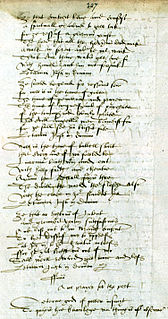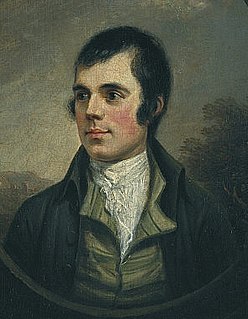Related Research Articles

Sorley MacLean was a Scottish Gaelic poet, described by the Scottish Poetry Library as "one of the major Scottish poets of the modern era" because of his "mastery of his chosen medium and his engagement with the European poetic tradition and European politics". Nobel Prize Laureate Seamus Heaney credited MacLean with saving Scottish Gaelic poetry.
Angus Lindsay Ritchie Calder was a Scottish writer, historian, and poet. Initially studying English literature, he became increasingly interested in political history and wrote a landmark study on Britain during the Second World War in 1969 entitled The People's War. He subsequently wrote several other historical works but became increasingly interested in literature and poetry and worked primarily as a writer, though often holding a number of university teaching positions. A socialist, he was a prominent Scottish public intellectual during the 1970s and 1980s.
Lallans, is a term that was traditionally used to refer to the Scots language as a whole. However, more recent interpretations assume it refers to the dialects of south and central Scotland, while Doric, a term once used to refer to Scots dialects in general, is now generally seen to refer to the Mid Northern Scots dialects spoken in the north-east of Scotland.

Christopher Murray Grieve, best known by his pen name Hugh MacDiarmid, was a Scottish poet, journalist, essayist and political figure. He is considered one of the principal forces behind the Scottish Renaissance and has had a lasting impact on Scottish culture and politics. He was a founding member of the National Party of Scotland in 1928 but left in 1933 due to his Marxist–Leninist views. He joined the Communist Party the following year only to be expelled in 1938 for his nationalist sympathies. He would subsequently stand as a parliamentary candidate for both the Scottish National Party (1945) and British Communist Party (1964).
The Scottish Renaissance was a mainly literary movement of the early to mid-20th century that can be seen as the Scottish version of modernism. It is sometimes referred to as the Scottish literary renaissance, although its influence went beyond literature into music, visual arts, and politics. The writers and artists of the Scottish Renaissance displayed a profound interest in both modern philosophy and technology, as well as incorporating folk influences, and a strong concern for the fate of Scotland's declining languages.
Sydney Goodsir Smith was a New Zealand-born Scottish poet, artist, dramatist and novelist. He wrote poetry in literary Scots often referred to as Lallans, and was a major figure of the Scottish Renaissance.
The Golden Treasury of Scottish Poetry was edited by Hugh MacDiarmid, and published in 1940. From the introduction:
Alan Norman Bold (1943–1998) was a Scottish poet, biographer, journalist and saxophonist. He was born in Edinburgh.
Professor Duncan Munro Glen was a Scottish poet, literary editor and Emeritus Professor of Visual Communication at Nottingham Trent University. He became known with his first full-length book, Hugh MacDiarmid and the Scottish Renaissance. His many verse collections included from Kythings and other poems (1969), In Appearances (1971), Realities Poems (1980), Selected Poems 1965–1990 (1991), Selected New Poems 1987–1996 (1998) and Collected Poems 1965–2005 (2006). His Autobiography of a Poet appeared with Ramsay Head Press in 1986. He edited Akros magazine for 51 numbers from August 1965 to October 1983. His work to promote Scottish poets and artists included Hugh MacDiarmid and Ian Hamilton Finlay, among others. Some of his poetry was translated into Italian.

Jenni Calder is a Scottish literary historian, and arts establishment figure.
Roderick Watson is a Scottish poet. He is a professor emeritus in English Studies at the University of Stirling.
Informationist poetry was a literary movement of the 1990s in Scotland. The poets usually associated with this movement are: Richard Price – who coined the term in 1991 in the magazine Interference – Robert Crawford, W. N. Herbert, David Kinloch, Peter McCarey and Alan Riach.
Dilys Rose is a Scottish fiction writer and poet. Born in 1954 in Glasgow, Rose studied at Edinburgh University, where she taught Creative Writing from 2002 until 2017. She was Director of the MSc in Creative Writing by Online Learning from 2012 to 2017. She is currently a Royal Literary Fellow at the University of Glasgow. Her third novel Unspeakable was published by Freight Books in 2017.

The Association for Scottish Literary Studies (ASLS) is a Scottish educational charity, founded in 1970 to promote and support the teaching, study and writing of Scottish literature. Its founding members included the Scottish literary scholar Matthew McDiarmid (1914–1996). Originally based at the University of Aberdeen, it moved to its current home within the University of Glasgow in 1996. In November 2015, ASLS was allocated £40,000 by the Scottish Government to support its work providing teacher training and classroom resources for schools.

Christopher Whyte is a Scottish poet, novelist, translator and critic. He is a novelist in English, a poet in Scottish Gaelic, the translator into English of Marina Tsvetaeva, Pier Paolo Pasolini and Rainer Maria Rilke, and an innovative and controversial critic of Scottish and international literature. His work in Gaelic appears under the name Crìsdean MacIlleBhàin.
Alexander Scott (1920–1989) was a Scottish poet, playwright and scholar born in Aberdeen. He wrote poetry in both Scots and Scottish English as well as plays, literary reviews and critical studies of literature. AS a writer, scholar, dramatist, broadcaster, critic and editor, he showed a life-ling commitmemt to Scottish literary culture. He was latterly a tutor and reader of Scottish literature at the University of Glasgow, where he was instrumental in establishing Scotland's first Department of Scottish Literature in the academic year 1971–72.

Poetry of Scotland includes all forms of verse written in Brythonic, Latin, Scottish Gaelic, Scots, French, English and Esperanto and any language in which poetry has been written within the boundaries of modern Scotland, or by Scottish people.

Scots-language literature is literature, including poetry, prose and drama, written in the Scots language in its many forms and derivatives. Middle Scots became the dominant language of Scotland in the late Middle Ages. The first surviving major text in Scots literature is John Barbour's Brus (1375). Some ballads may date back to the thirteenth century, but were not recorded until the eighteenth century. In the early fifteenth century Scots historical works included Andrew of Wyntoun's verse Orygynale Cronykil of Scotland and Blind Harry's The Wallace. Much Middle Scots literature was produced by makars, poets with links to the royal court, which included James I, who wrote the extended poem The Kingis Quair. Writers such as William Dunbar, Robert Henryson, Walter Kennedy and Gavin Douglas have been seen as creating a golden age in Scottish poetry. In the late fifteenth century, Scots prose also began to develop as a genre. The first complete surviving work is John Ireland's The Meroure of Wyssdome (1490). There were also prose translations of French books of chivalry that survive from the 1450s. The landmark work in the reign of James IV was Gavin Douglas's version of Virgil's Aeneid.
Alexander Moffat, OBE, RSA, known as Sandy Moffat, is a painter, author, philosopher, and teacher.

Robert Crombie Saunders was a poet, editor, journalist and teacher, and a significant figure in the Scottish Literary Renaissance of the 20th century. His poetry is in both English and Scots, and he identified with the 'Lallans' movement, which sought to revive Scots as a serious literary medium.
References
- 1 2 Smith, Anna. 'Riach, Alan (Scott)'. Encyclopedia.com. Retrieved 16 April 2022.
- ↑ Riach, Alan; Gifford, Douglas, eds. (1 October 2004). Scotlands: Poets and the Nation (1st ed.). Manchester: Carcanet Press Ltd. ISBN 9781857547405.
- ↑ Guardian, 21 June 1979.
- 1 2 "Alan Riach: Scottish Poetry Library" . Retrieved 6 June 2021.
- ↑ "University of Glasgow :: School of Critical Studies :: Our staff :: Prof Alan Riach" . Retrieved 11 August 2013.
- ↑ "Profile: Alan Riach". www.thenational.scot. Retrieved 21 November 2018.